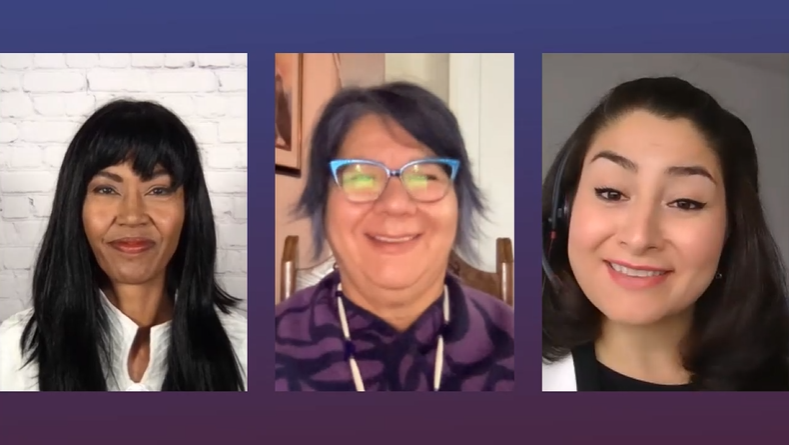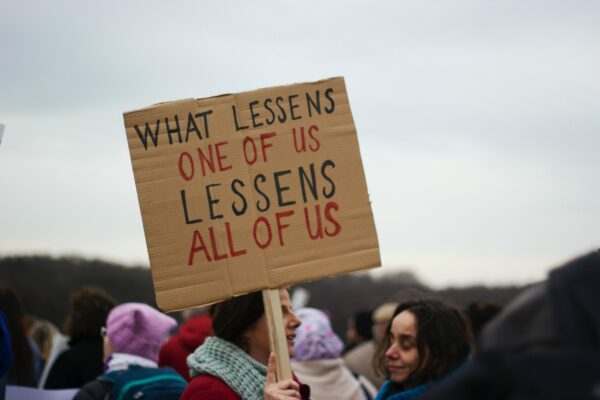
On July 29, 2021, the Equal Futures Network, an initiative of the Canadian Partnership for Women and Children’s Health (CanWaCH), in partnership with the Government of Canada hosted a public broadcast celebrating women in leadership from across the country. Viewers heard from the Assembly of First Nations National Chief RoseAnne Archibald and the Honourable Maryam Monsef, Minister for Women and Gender Equality and Rural and Economic Development as they shared their reflections on their experience in positions of leadership. You can watch a recording of the broadcast here.
Following the broadcast, local leaders and youth champions from coast-to-coast-to-coast were invited to participate in a private-roundtable discussion. Here is what we heard:
What we have learned during the pandemic
ADAPT, INNOVATIVE AND MOBILIZE: Over the last year and a half, communities have been able to adapt and find innovative solutions when providing services, programs and activities. The silver-lining of the pandemic has been all the help that people offered to those around them. They just need the proper tools and information to act on that goodwill.
COLLABORATION: Building relationships between multiple levels of government (municipal, provincial and federal) and service providers makes it easier to manage crises. COVID-19 has shown us how interconnected we all are while forcing us to become more insular-focused at the same time. There is also an opportunity for further intergenerational collaboration.
REST AND SELF-CARE: The pandemic has been exhausting and overwhelming for many. Leaders’ reflected on the pressure and responsibility they have experienced and how it is important to take time to pause, reflect and to engage in self-care. Rest is an essential component of a just and equitable recovery from COVID-19.
RECOGNIZING LOCAL AND GLOBAL INEQUALITIES: The move to online activities was especially difficult for senior citizens as well as rural and remote communities with limited access to the internet. While times have been hard in communities across the country, young leaders also noted how COVID-19 has shone a light on global inequities.
COVID-19 has shown us the resiliency of communities from coast-to-coast-to-coast.
Where we go from here
FOSTER YOUNG LEADERSHIP: Encourage young women and gender-diverse people to run for positions of leadership (town council, mayor, MLA, etc.). Just by putting your name forward for consideration, you are encouraging the next generation by showing them that they can do it too.
It is a difficult transition from grassroots organizing to running for public office. How do we make politics and civic engagement more accessible? There is a need to develop programs that offer the necessary skills and knowledge for women and gender-diverse people to run for office successfully.
FLEXIBLE WORK ENVIRONMENTS: Employers need to exercise flexibility in order to accommodate the context and the varying needs of families (caregivers, children, etc.) while creating an environment that supports connection, collaboration, and mental health and wellness. There is also a need for standardized and accessible parental leave across regions – this is particularly important for working mothers.
CREATE POSITIVE AND ACCESSIBLE ONLINE SPACES: COVID-19 forced a shift to online activities which provided additional flexibility and accessibility. However, ‘Zoom fatigue’ is a challenge which can result in lower engagement. The pandemic has highlighted the toxicity of social media. There is a strong need to address this and figure out how to effectively reach and engage our communities online. It is also crucial that we continue to prioritize accessibility after we are able to resume in-person activities.
LEARN FROM THE PAST: We need to learn from our past and people who have come before us. Sometimes, important histories aren’t taught in school. The best way to learn is to listen to members of marginalized communities and give up our power so that these voices are at the forefront of the conversation.
DATA AND RESEARCH: Good data is key to shape effective and equitable policies and programs. Right now, the data shows a disproportionate impact of COVID-19 on women and girls. Women are behind in job recovery, leaving the workforce in droves, and domestic violence is on the rise. We need disaggregated data to be able to get an accurate picture of how the pandemic is uniquely affecting specific populations. Good data is KEY to creating good, equitable policies.
Get involved
Connect with organizations working within your community. Connect with us now on social media and join the network.
ADDITIONAL RESOURCE:
The Equal Futures Network acknowledges that Indigenous people are the traditional guardians of Turtle Island, on the land also known as Canada






